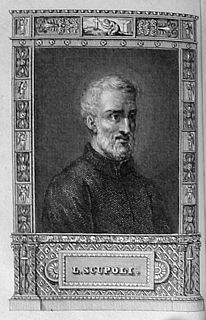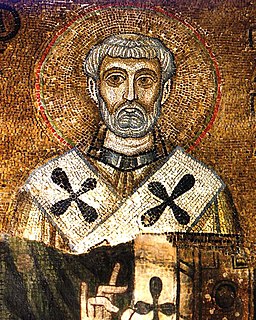A Quote by Maximus the Confessor
Just as the teaching of the Law and the prophets, being harbingers of the coming advent of the Logos in the flesh, guide our souls to Christ (cf. Gal. 3:24), so the glorified incarnate Logos of God is Himself a harbinger of His spiritual advent, leading our souls forward by His own teachings to receive His divine and manifest advent. He does this ceaselessly, by means of the virtues converting those found worthy from the flesh to the spirit. And He will do it at the end of the age, making manifest what has hitherto been hidden from men.
Related Quotes
Before His visible advent in the flesh the Logos of God dwelt among the patriarchs and prophets in a spiritual manner, prefiguring the mysteries of His advent. After His incarnation He is present in a similar way not only to those who are still beginners, nourishing them spiritually and leading them toward the maturity of divine perfection, but also to the perfect, secretly pre-delineating in them the features of His future advent as if in an ikon.
The Advent season is that time when we seek to, in a manner of speaking, mute our memory of what has already happened, that we might brighten our joy that it happened. We leave the already of His advent to taste the bitter of the not yet. We, in short, go back, that we might look forward to His coming.
By his own will Christ was dependent on Mary during Advent: he was absolutely helpless; he could go nowhere but where she chose to take him; he could not speak; her breathing was his breath; his heart beat in the beating of her heart.... In the seasons of our Advent - waking, working, eating, sleeping, being - each breath is a breathing of Christ into the world.
If the divine Logos of God the Father became son of man and man so that He might make men gods and the sons of God, let us believe that we shall reach the realm where Christ Himself now is; for He is the head of the whole body (cf. Col. 1:18), and endued with our humanity has gone to the Father as forerunner on our behalf. God will stand 'in the midst of the congregation of gods' (Ps. 82:1 LXX) - that is, of those who are saved - distributing the rewards of that realm's blessedness to those found worthy to receive them, not separated from them by any space.
If we keep the path of virtue undefiled through devout and true knowledge, and do not deviate to either side, we will experience the advent of God revealed to us because of our dispassion. For 'I will sing a psalm and in a pure path I will understand when Thou wilt come to me' (cf. Ps. 101:1-2). The psalm stands for virtuous conduct; understanding indicates the spiritual knowledge, gained through virtue, by means of which we perceive God's advent, when we wait for the Lord vigilant in the virtues.
If you expound the teaching of the Logos from the standpoint of the moral life, using materialistic words and examples which correspond to the capacity of your hearers, you make the Logos flesh. Conversely, if you elucidate mystical theology by means of the higher forms of contemplation you make the Logos spirit.
Prayer is the converse of the soul with God. Therein we manifest or express to Him our reverence, and love for His divine perfection, our gratitude for all His mercies, our penitence for our sins, our hope in His forgiving love, our submission to His authority, our confidence in His care, our desires for His favour, and for the providential and spiritual blessings needed for ourselves and others.
Total surrender to the will of God actually is sacrificing oneself as a burnt offering to God. The proof of this state is dying to oneself, - to one's own opinions, wishes and feelings or tastes, in order to live by Divine intellect, in conformity with the Divine will and in partaking of God. In the forefront of this endeavor is our Lord and Savior. He surrendered the whole of Himself to God the Father, and us in Himself, 'For we are members of His body, of His flesh, and of His bones' (Eph. 5:30). So let us hasten in His footsteps?
This Advent we look to the Wise Men to teach us where to focus our attention. We set our sights on things above, where God is. We draw closer to Jesus... When our Advent journey ends, and we reach the place where Jesus resides in Bethlehem, may we, like the Wise Men, fall on our knees and adore him as our true and only King.
A Christian is one who recognizes Jesus as the Christ, the Son of the living God, as God manifested in the flesh, loving us and dying for our redemption; and who is so affected by a sense of the love of this incarnate God as to be constrained to make the will of Christ the rule of his obedience, and the glory of Christ the great end for which He lives.
Through the fall our nature was stripped of divine illumination and resplendence. But the Logos of God had pity upon our disfigurement, and in His compassion He took our nature upon Himself. On Tabor He manifested it to His elect disciples clothed once again most brilliantly. He showed what we once were and what we shall become through Him in the age to come if we choose to live our present life, as far as possible, in accordance with His ways.
Who can describe the bond of God's love? Who is able to explain the majesty of its beauty? The height to which love leads is indescribable. ... In love the master received us, Jesus Christ our Lord, in accordance with God's will gave his blood for us, and his flesh for our flesh, and his life for our lives.
For those who have already experienced the grace of Almighty God through faith in the Lord Jesus Christ, prayer becomes the catalyst for fellowship with the Lord of our souls, redeemed by his blood. By tapping into the channel by which we commune with the One who calls his children “friends,” we can receive his strength in our weakness; his guidance in our steps; and his mercy when we stumble along life's path.
He who through virtue and spiritual knowledge has brought his body into harmony with his soul has become a harp, a flute and a temple of God. He has become a harp by preserving the harmony of the virtues; a flute by receiving the inspiration of the Spirit through divine contemplation; and a temple by becoming a dwelling place of the Logos through the purity of his intellect.

























